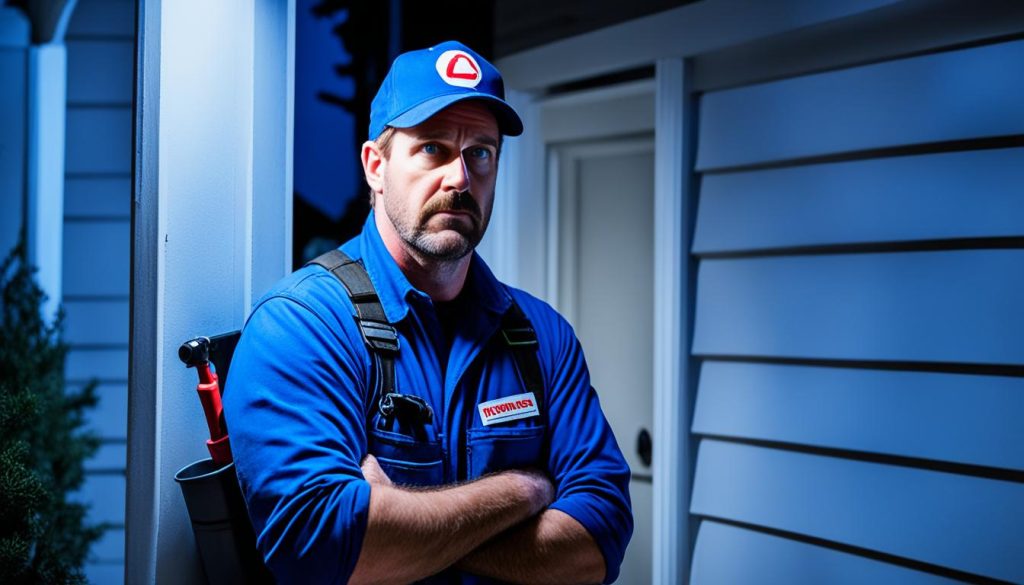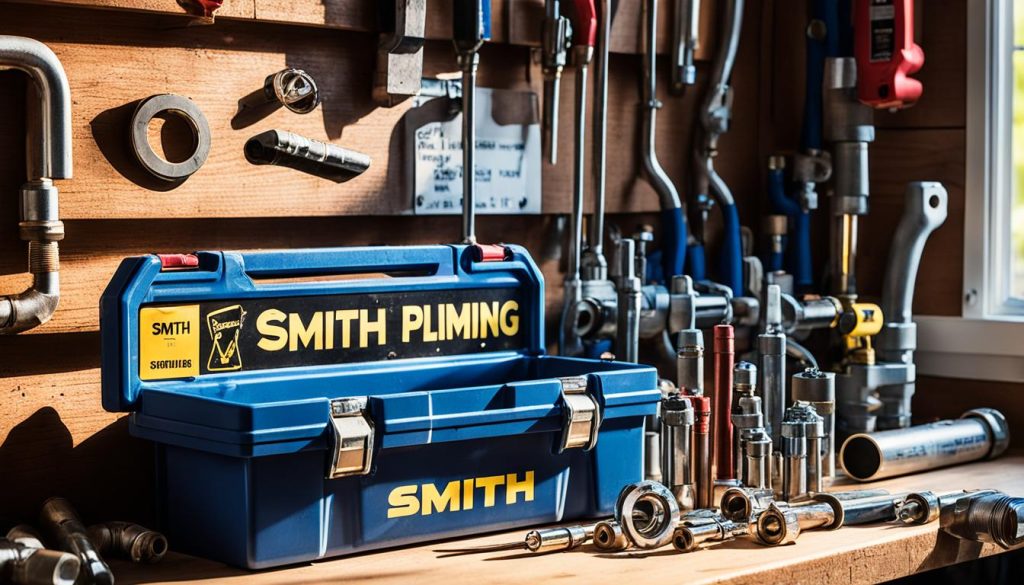Is It Hard to Become a Plumber? Challenges Explored
Did you know that becoming a plumber can lead to a rewarding and fulfilling career? Despite the common misconceptions, plumbing offers a wide range of opportunities and benefits. However, like any profession, it comes with its own set of challenges. In this article, we’ll delve into the realities of becoming a plumber in Canada, exploring the steps to become a plumber, the required training and certifications, and the potential career path ahead.
Key Takeaways:
- Becoming a plumber in Canada presents both advantages and challenges.
- Plumbing offers steady employment opportunities and a potentially lucrative career path.
- Plumbers face physical demands and must be prepared for unpredictable work schedules.
- Starting a plumbing business provides entrepreneurial possibilities for those willing to take on the extra effort.
- Training and certification are essential requirements for becoming a licensed plumber in Canada.
Demand for Plumbers in Ontario
According to the Government of Canada Job Bank, the job outlook for plumbers in Ontario is promising, with a steady demand expected until 2025. This provides excellent career prospects for individuals considering entering the plumbing industry. Several factors contribute to the continuous demand for plumbers in the province.
One significant factor driving the demand for plumbers is the increased investment in public infrastructure projects in Ontario. The government’s investment in the development and improvement of schools, hospitals, and transit systems creates a need for skilled plumbers to install and maintain plumbing systems in these facilities.
Moreover, there is a growing demand for repair, maintenance, and renovation work in Ontario. Many older buildings and homes require plumbing upgrades to enhance energy efficiency and comply with modern codes and regulations. This presents opportunities for plumbers to work on projects that involve updating plumbing systems to be more environmentally friendly.
With this steady demand, plumbers can expect to have consistent employment opportunities in Ontario. The plumbing industry trends indicate a positive outlook, making it an attractive career choice for individuals who enjoy working with their hands and problem-solving. The investment in infrastructure and the increasing focus on sustainability further contribute to the need for skilled plumbers in the province.
| Factors Driving Demand for Plumbers in Ontario |
|---|
| Increased investment in public infrastructure projects |
| Growing demand for repair, maintenance, and renovation work |
As seen in the table and image above, the demand for plumbers in Ontario is influenced by various factors. The investment in infrastructure projects and the need to upgrade older plumbing systems contribute to the consistent employment opportunities available in the province.
Work Schedule and On-Call Duties
As a plumber, my work schedule is typically based on eight-hour shifts, providing a sense of predictability and structure to my day-to-day routine. However, the plumbing profession also requires a high degree of flexibility and adaptability due to the nature of the work.
Plumbers often find themselves on-call, ready to respond to emergency plumbing situations at any given moment. Burst pipes, clogged drains, and other urgent issues can arise unexpectedly, including during nights, weekends, and holidays. Being an on-call plumber means being available to address these emergencies and provide immediate solutions.
Being an on-call plumber requires a willingness to work outside regular hours. It can be demanding, but it also offers a sense of fulfillment knowing that I play a crucial role in helping people during their plumbing emergencies. Whether it’s a homeowner with a flooded basement or a business owner facing a major plumbing issue, I am there to provide my expertise and resolve the problem swiftly.
The unpredictable nature of the job means that my work hours can vary significantly from day to day. While I have a set schedule for my regular shifts, I must remain flexible and prepared to step in whenever an emergency arises. It requires quick thinking, problem-solving skills, and the ability to work well under pressure.
Responding to on-call duties and emergency plumbing services is an essential aspect of the plumbing profession. It reflects the dedication and commitment that plumbers have towards ensuring the safety and well-being of their clients. While the schedule may be challenging at times, the satisfaction of providing immediate assistance and resolving urgent plumbing issues outweighs the occasional inconvenience.
Benefits of an On-Call Plumber
Being an on-call plumber offers numerous benefits, both professionally and personally. The ability to provide emergency plumbing services demonstrates expertise and builds trust with clients, leading to long-term customer relationships and referrals. Additionally, being an on-call plumber often comes with higher rates of pay, compensating for the flexibility and availability required.
While the work schedule can be demanding, the flexibility in the plumbing profession allows me to balance my personal and professional life effectively. It enables me to manage my time efficiently, accommodate personal responsibilities, and still be available to respond to plumbing emergencies when needed.
The opportunity to make a significant impact in people’s lives during their plumbing crises is immensely rewarding. Being able to solve urgent problems promptly and restore clients’ plumbing systems brings a sense of accomplishment and satisfaction.
| Benefits of Being an On-Call Plumber |
|---|
| Opportunity to showcase expertise in emergency situations |
| Builds trust and fosters long-term client relationships |
| Potential for higher rates of pay |
| Flexible work schedule for better work-life balance |
| Opportunity to make a significant impact in people’s lives |
Entrepreneurial Opportunities in Plumbing
Starting a plumbing business can be a rewarding venture for self-motivated individuals in the plumbing industry. In fact, in Ontario, 19% of plumbers are self-employed, compared to 12% in other occupations [1].
As an ambitious plumber, becoming your own boss opens up a world of possibilities. Starting a plumbing contracting company allows you to take control of your career and have the potential to earn unlimited income. Unlike working for someone else, the profits from your business belong to you, providing a direct incentive for success and growth.
To succeed in the world of plumbing entrepreneurship, it’s important to have a solid business plan, market your services effectively, and provide exceptional customer service. Building a strong network of clients and establishing a good reputation in the industry are key factors in maintaining a profitable plumbing business.
Here is a brief overview of the steps to starting a plumbing business:
- Research and develop a business plan that outlines your goals, target market, financial projections, and marketing strategies.
- Register your plumbing business and obtain the necessary licenses and permits.
- Secure the appropriate insurance coverage to protect your business and clients.
- Purchase the required plumbing tools and equipment to perform your services.
- Establish a professional online presence through a website and social media platforms.
- Market your services to potential clients through various channels, such as online advertising, networking, and referrals.
By starting your own plumbing business, you have the flexibility to set your own hours, choose the projects you want to work on, and build a team of skilled professionals. With dedication and hard work, the earning potential as a self-employed plumber is significant.
| Advantages of Starting a Plumbing Business | Challenges of Starting a Plumbing Business |
|---|---|
|
|
While starting a plumbing business requires extra effort and dedication, the rewards and opportunities for growth make it an attractive option for ambitious plumbers. By taking the leap into entrepreneurship, you can turn your passion for plumbing into a successful and fulfilling career.
References:
[1] Government of Canada Job Bank. (n.d.). Plumbers [Occupational Outlook].Physical Demands of Plumbing Work
Plumbing work involves a significant amount of manual labor and physical exertion. Plumbers often find themselves in challenging working conditions, performing tasks that require strength, agility, and endurance. Let’s take a closer look at the physical demands and the unique working conditions that plumbers face in their everyday job.
One of the physical demands of plumbing is the need to crawl into cramped spaces. Plumbers frequently work in tight areas such as crawl spaces, attics, and under sinks, requiring them to maneuver and contort their bodies to access plumbing systems. This aspect of the job can be physically demanding and uncomfortable.
In addition to working in confined spaces, plumbers often have to carry heavy accessories and tools. Hauling equipment, pipes, and fixtures from one location to another can put strain on the body, especially when working in larger commercial or industrial settings. Plumbers need to have the strength and stamina to transport heavy materials safely and efficiently.
Another challenge plumbers face is working in various weather conditions. Whether it’s scorching heat or freezing temperatures, plumbers are often required to work outdoors, exposed to the elements. This means enduring extreme temperatures, rain, snow, and other adverse weather conditions to get the job done.
The physical demands of plumbing work also involve repetitive movements and positions. Plumbers frequently find themselves bending, crouching, and hunching over while installing or repairing pipes, drainage systems, and fixtures. These sustained positions can strain muscles, joints, and the back, making the work physically demanding and potentially leading to fatigue or discomfort.
Despite the physical challenges, the demanding aspects of plumbing are also what make the profession unique and varied. Plumbers have the opportunity to work on different projects, face new challenges every day, and continuously develop their problem-solving skills. Overcoming the physical demands and working conditions in plumbing can be rewarding for those who enjoy hands-on manual labor and take pride in their ability to overcome obstacles.
| Physical Demands | Challenging Aspects | Working Conditions |
|---|---|---|
| Crawling into cramped spaces | Carrying heavy accessories and tools | Working in various weather conditions |
| Bending, crouching, and hunching over | Enduring repetitive movements and positions |
Plumbing work requires physical strength, flexibility, and resilience to tackle the demanding nature of the job. However, for those who thrive in hands-on manual labor and enjoy the challenge of troubleshooting and problem-solving, the physical demands of plumbing can be seen as part of the rewarding and fulfilling nature of the profession.
Problem-Solving and Handling Pressure in Plumbing
As a plumber, problem-solving is an inherent part of the job. Whether I’m roughing in a new house, tracking down the source of a leak, or responding to emergency plumbing situations, I’m constantly faced with challenges that require me to think on my feet and find practical solutions. Each day brings a new set of problems to solve, which keeps the job interesting and rewarding.
Working under pressure is another skill that plumbers must possess. In this profession, there are often tight deadlines to meet, especially when dealing with emergency plumbing situations. When a pipe bursts or a sewer line backs up, clients rely on plumbers to resolve the issue quickly and efficiently. It’s important to stay composed and professional, even in high-pressure situations, to ensure the safety and satisfaction of clients.
Meeting tight deadlines is essential in the plumbing industry. Homeowners and businesses depend on prompt plumbing services to minimize disruptions and prevent further damage. Whether it’s repairing a broken water heater or unclogging a drain, I understand the importance of completing tasks within the agreed-upon timeframe. I take pride in my ability to manage my time effectively and meet tight deadlines, ensuring that my clients can get back to their daily routines as soon as possible.
Example Emergency Plumbing Situation
Let me illustrate the problem-solving and pressure-handling skills required in an emergency plumbing situation. Imagine receiving a call from a panicked homeowner in the middle of the night, reporting a major water leak that threatens to flood their home. As a plumber, I must act swiftly and efficiently to resolve the issue before extensive damage occurs.
Upon arrival, I assess the situation, locate the source of the leak, and shut off the water supply to prevent further damage. I then work meticulously to repair or replace the damaged pipe, ensuring a proper seal to prevent future leaks. Throughout the process, I communicate with the homeowner, explaining the steps taken to resolve the issue and providing reassurance.
In this intense situation, problem-solving skills and the ability to work under pressure are crucial. By remaining calm and focused, I am able to effectively address the emergency, minimize the damage, and restore peace of mind to the homeowner.
| Problem-Solving Skills | Handling Pressure | Meeting Tight Deadlines |
|---|---|---|
| Quickly identifying plumbing issues | Remaining calm and composed in high-pressure situations | Efficiently completing tasks within specified timeframes |
| Developing effective solutions to plumbing problems | Adapting to unexpected challenges | Prioritizing tasks to ensure timely completion |
| Using problem-solving techniques to troubleshoot | Providing reassurance and maintaining professionalism | Managing time effectively to meet client expectations |
Training and Certification Requirements for Plumbers in Ontario
To become a plumber in Ontario, individuals must complete an apprenticeship and pass a certification exam. Many people choose to take pre-apprenticeship training to gain basic knowledge and safety training before starting their apprenticeship. This combination of classroom and on-the-job training is essential for becoming a licensed plumber. Employers often prefer to hire apprentices who already have the basics and safety training.
Benefits of Pre-Apprenticeship Training
Pre-apprenticeship training provides aspiring plumbers with a solid foundation in the trade before they begin their official apprenticeship. This type of training program covers the fundamental skills and knowledge needed to succeed in the plumbing industry.
- Basic plumbing techniques and tools
- Blueprint reading and pipefitting
- Installation and repair of plumbing systems
- Health and safety regulations
By completing pre-apprenticeship training, individuals can demonstrate their commitment to the trade and gain a competitive edge when seeking apprenticeship opportunities.
The Apprenticeship Program
Once individuals have completed pre-apprenticeship training or secured an apprenticeship position, they can begin their journey towards becoming a licensed plumber. The apprenticeship program typically consists of a combination of on-the-job training and in-school technical training.
During the apprenticeship, aspiring plumbers work under the guidance of experienced professionals to gain practical skills and hands-on experience in real-world plumbing scenarios. They learn how to install and repair plumbing fixtures, troubleshoot plumbing systems, and follow industry best practices.
In addition to on-the-job training, apprentices also attend technical training sessions at approved training centers or colleges. These sessions provide a comprehensive understanding of plumbing theory, codes, regulations, and safety practices.
Certification Exam
After completing the required number of training hours and successfully fulfilling the apprenticeship program, individuals are eligible to take the certification exam. This exam evaluates their knowledge and skills in various aspects of plumbing, including installation, maintenance, and repair.
Passing the certification exam is essential for obtaining a plumbing license in Ontario. It demonstrates that individuals have met the necessary standards and are qualified to work as professional plumbers.
It’s worth noting that different provinces may have slightly different requirements for certification. Therefore, it’s essential for aspiring plumbers to research and ensure they meet the specific requirements of the province in which they intend to work.
Overview and Conclusion
Becoming a plumber offers a unique blend of advantages and challenges. On one hand, it presents steady employment opportunities, entrepreneurial possibilities, and the excitement of facing new challenges every day. On the other hand, it is important to note that the profession can be physically demanding and requires excellent problem-solving skills and the ability to work under pressure.
One of the key benefits of becoming a plumber is the availability of stable employment opportunities. With the demand for plumbers projected to remain strong in Ontario, there is a consistent need for skilled professionals in the industry. Whether working for a plumbing company or as a self-employed plumber, there is a reliable source of work and income.
Moreover, the plumbing profession also offers the potential for entrepreneurship. Many plumbers successfully establish their own plumbing contracting businesses, which allows them to be their own boss and unlock limitless earning potential. This avenue appeals to ambitious individuals who are willing to put in extra effort to build a successful business.
However, it is essential to acknowledge the challenges associated with becoming a plumber. The physical demands of the job, such as working in confined spaces, carrying heavy equipment, and enduring varying weather conditions, require physical stamina and resilience. Additionally, the ability to think quickly and handle high-pressure situations is crucial in responding to emergency plumbing issues and meeting tight deadlines.
To overcome these challenges and embark on a rewarding career as a plumber, individuals must complete the necessary training and certification requirements. Engaging in apprenticeships, acquiring pre-apprenticeship training, and obtaining the required safety certifications are vital prerequisites for becoming a licensed plumber in Ontario. By understanding the realities of the profession and acquiring the necessary skills, aspiring plumbers can position themselves for a fulfilling and prosperous career.
- Investing Wisely: How Windows & Doors in Boost Property Value and Financial Health - April 24, 2025
- The Financial Impact of Personal Injuries: Why Legal Help Matters for Business Owners - April 16, 2025
- The Hidden Financial Costs of Domestic Assault: What Business Owners Need to Know - April 16, 2025













